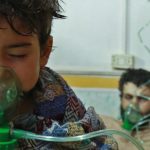COVID -19 has kept many other outrages out of sight – and, for some governments, probably the hope that those outrages might be forgotten entirely.
The Syrian government is one that might have been banking on some amnesia as far as chemical weapons use is concerned. It will be disappointed, likely infuriated, that the Organisation for the Prohibition of Chemical Weapons (OPCW), an intergovernmental organization that oversees the implementation of the Chemical Weapons Convention (CWC), this month affirmed the longstanding and extensive documentation of the Syrian government’s repeated, abhorrent, and illegal use of chemical weapons.
The OPCW’s newly established Investigation and Identification Team (IIT) concluded in a report issued on April 8 that there are “reasonable grounds” to believe that Syrian air force planes and helicopters were responsible for dropping aerial bombs of the highly toxic nerve agent sarin and a cylinder of chlorine on three separate occasions on the village of al-Latamneh. The IIT estimates more than 100 women, men, and children were injured in these attacks, of whom three died.
One chemical attack that the IIT investigated on al-Latamneh Surgical Hospital was previously documented by Physicians for Human Rights (PHR). Based on an analysis of open-source data, PHR researchers concluded that on March 25, 2017: “a barrel bomb containing a toxic substance believed to be chlorine was dropped on al-Latamneh Surgical Hospital. A doctor was killed, and the hospital temporarily suspended its operations. Due to the weapon used in the attack, PHR believes that Syrian government forces were responsible for the incident.” The OPCW has confirmed this conclusion following its highly detailed analysis in the new report.
Chemical weapons use is illegal under an international treaty signed or ratified by 193 nations, including Syria. It is disgraceful that Syria, which is a signatory to the Chemical Weapons Convention forbidding such use, continues to use sarin and chlorine with impunity. Syria provided no help to the IIT and has dismissed its conclusions as “misleading”; it accused the OPCW report of containing “falsified and fabricated conclusions aimed at falsifying truths and accusing the Syrian government,” without elaborating. But the IIT report, based on multiple sources of information, interviews, physical tests on samples, flight records, and the like, is suitably forensic and provides powerful evidence of the Syrian government’s illegal use of chemical weapons.
The IIT’s remit is to identify those who use chemical weapons. This it has done, although the names of individual actors in government and the Syrian air force involved in these illegal attacks have been redacted in the published report. However, they are clearly now known. Syria cannot be allowed to get away with flouting the CWC. If no action is taken to hold the perpetrators of chemical weapons use accountable, of what value is the Chemical Weapons Convention?
The Executive Council of the OPCW must now decide what action it should follow. So, too, must the United Nations’ Secretary-General, Antonio Guterres. The potential duration of the trauma of dealing with COVID-19 remains an open question. But in the meantime, the international community must decide what it does to punish those Syrian officials who have repeatedly and flagrantly flouted the rules on chemical weapons use.

